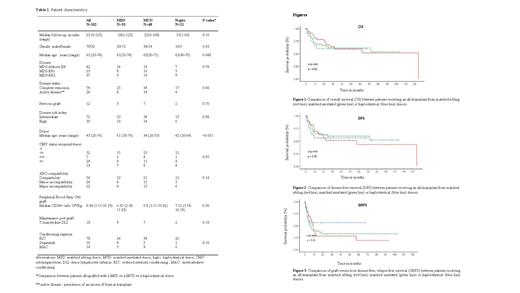Abstract

Introduction: Allogeneic stem cell transplantation (allo-SCT) remains the only curative option for patients with myelodysplastic syndrome (MDS). If recent data have shown encouraging results with haploidentical (haplo) donors in this context, no comparison with allo-SCT using other source of graft (matched sibling [MSD] or unrelated [MUD] donors) has been reported so far.
Methods: We retrospectively considered 102 consecutive adults transplanted for MDS between March 2010 and August 2020 in our Department, comparing outcomes between those receiving a graft from a MSD, a MUD or a haplo-donor.
Results : Thirty-three, 48 and 21 patients respectively received a graft from a MSD, MUD or haplo donor. Peripheral blood stem cells (PBSC) were the source of graft for all patients. The median age of the whole cohort was 63 years old (range: 20-74) and the median follow-up was 23 months (range: 0-125). The three groups shared similar characteristics (gender, type of MDS, disease status, disease risk index, CMV status, ABO compatibility, peripheral blood stem cells graft count, conditioning regimen) except median recipient age which was younger in matched patients ( 61 vs 65 MUD vs 65 Haplo, p=0,04) and median donor age which was older in matched transplant ( 61 vs 34 MUD vs 42 Haplo, p< 0,001) (Table 1). With a median follow-up of 46,4 months, the 4-year OS (Figure 1) was comparable between the three groups (haplo: 60.1 % ± 11,0 % , MSD: 59,0 % ±9,4 % and MUD: 61.2 % ± 7,2 %, p = 0.88) as well as the 4-year DFS (Figure 2) (55.9 % ± 11,1 % vs 51,2 % ±9,2 % vs 59.6 % ± 7,2 %, p = 0.78) and the cumulative incidence (CI) of NRM (34.6 % ±12,4 % , 15,4% ± 6,4% and 23.8 % ± 6,4 %, p = 0.21). Also, the 4-year CI of acute grade 3-4 GVHD (14,3% vs 15,2% vs 20,8%, p=0.79) and of moderate/severe chronic GVHD (14,3% vs 24.2% vs 27,1%, p=0.56) were not significantly different. The 4-year GRFS seemed better with haplo (Figure 3) but this was not statistically significant (56,1 % ± 11,0% vs 28,1% ±9,2 % vs 32,8 % ± 7,4%,p=0 .41).
Conclusions: These data suggest that haplo-identical donors represent a valid alternative in MDS patients lacking a MSD or a MUD for allo-SCT.
Moreau: Oncopeptides: Honoraria; Amgen: Honoraria; Celgene BMS: Honoraria; Janssen: Honoraria; Sanofi: Honoraria; Abbvie: Honoraria.
Author notes
 This icon denotes a clinically relevant abstract
This icon denotes a clinically relevant abstract


This feature is available to Subscribers Only
Sign In or Create an Account Close Modal